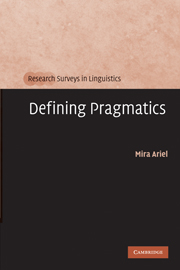Part I - Deconstructing pragmatics
Published online by Cambridge University Press: 05 June 2012
Summary
In the light of the way big-tent pragmatics evolved as a discipline within linguistics (1.2), it is not surprising that to this day many pragmatists find themselves with a very rich (and heterogeneous) set of data (as exemplified in 1.1), but with no unified definition (see again the quote from Prince in 1.2). Given the different research agendas and traditions incorporated into pragmatics, such a state of affairs is only to be expected. But while understandable in hindsight, this theoretical lacuna was far from acceptable to most practitioners. Many felt uncomfortable with the fact that what unified pragmatics into a discipline was the fact that it dealt with communicative aspects of linguistic behavior which, as it happens, could not be accounted for by generative grammar. Still, there was some rationale behind which additional issues were allowed in: family resemblance to bona fide pragmatic phenomena. This family resemblance created the impression that semanticists and pragmatists did have a solid pre-theoretical concept of pragmatics. The need for a definition, coupled with the intuitive belief that pragmatics was indeed a coherent field, led to many attempts to define the field. The success of these definitions is examined in Part I.
We here adopt the assumptions of the early pragmatics period (1970s and 1980s), and follow the attempts to inject positive content into the concept of pragmatics as distinct from grammar.
- Type
- Chapter
- Information
- Defining Pragmatics , pp. 21 - 22Publisher: Cambridge University PressPrint publication year: 2010



